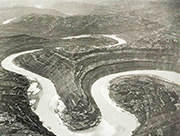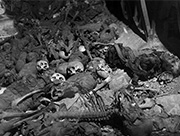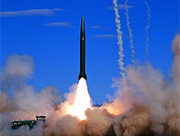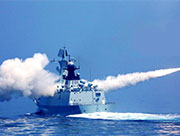

TIANJIN, Aug. 15 -- Death toll from the massive warehouse explosions in north China's Tianjin city Wednesday night rose to 104, local authorities said on Saturday night.
There are no deaths among 722 people who are hospitalized, including 58 in critical or serious condition, the rescue headquarters said.
A total of 46 people have been rescued by Saturday, said Zhou Tian, head of the city's fire department.
The latest rescued was a man in his fifties.
Specialized anti-chemical soldiers rescued him only 50 meters away from a burst point Saturday afternoon, two and a half days after two huge explosions at a warehouse for hazardous chemicals at about 11:30 p.m. Wednesday following a fire.
The man was conscious and could talk when rescued. He was immediately rushed to the hospital.
The man suffered from respiratory tract burn but was in a stable condition after emergency treatment, said Li Jingmei, a doctor from the No.254 hospital in Tianjin.
Seventy specialized anti-chemical soldiers in heavy uniforms entered the core area of the blasts site on Saturday morning to search for possible lives. Another 90 joined them to work in turns.
Meanwhile, another 1,100 troops were combing nearby residential quarters home by home to search for potential survivors.
Wen Wurui, head of the Tianjin municipal bureau of environmental protection, said environmental specialists are taking measures to prevent air and water pollution caused by chemicals leaked from the blasts.
Authorities have closed three sewage outlets to the sea and also used cement to block all drain outlets at the blast site to avoid pollution of waters outside the site, Wen said.
Other measures include the construction of cofferdams to prevent leaked chemicals from polluting farther when it rains, using hydrogen peroxide to reduce the amount of cyanide, and collection of sewage water at the blast site for special treatment.
Sodium cyanide, though highly toxic, is not volatile in normal conditions and only emit hydrogen cyanide into the air when meeting water, Wen said, adding dozens of stations are closely monitoring the quality of air and water.
Meanwhile, Minister of Public Security Guo Shengkun said saving lives will remain the top priority even beyond the 72-hour golden period for rescue.
He urged rescuers not to give up on hopes, while leaving no single corner unchecked during the search and rescue mission.
Guo also urged a scrupulous plan to handle and clean up hazardous chemicals in a scientific way, so as to absolutely prevent any impacts on rescuers and nearby residents.
Chinese President Xi Jinping on Saturday urged authorities to learn from the "extremely profound" lessons paid for with blood.
Xi said in a written instruction that the Tianjin blasts and a string of serious accidents recently exposed severe problems in the work safety sector, and authorities must always keep "safe growth" and "people's interest first" in mind to avoid such accidents.
Premier Li Keqiang urged authorities to take forceful and effective measures to rectify the weak link so as to formulate a long-term mechanism to avoid the repetition of accidents.
The State Council on Saturday called a national tele-conference to lay out work on a national safety inspection that will target industries related with dangerous chemicals, explosives, fireworks, elevators, non-coal mines, public transport and ports.
ANGUISHED RELATIVES
Three days after the blasts, Wang Liying from neighboring Hebei province still heard no news on the fate of her 19-year-old son Yuan Xuxu, a firefighter working for the Tianjin Port Group Co..
Yuan and dozens of his colleagues were among the first to arrive at the site to handle the raging fire prior to the two huge explosions.
The mother made phone calls to her son immediately after learning the blasts, but could not reach him. She then rushed to Tianjin, but only learned that there was no news for any one among his son's 25-member brigade.
Efforts to look for her son at hospitals also was in vain.
On Saturday morning, she joined a group of family members of missing firemen to a hotel where a press conference was held, hoping to get any clue. They failed again.
"I just wish my son could come back alive," Wang told reporters in tears. She said her son earlier planned to go back home to see her in November.
"We want to see our son, no matter he was alive or dead, " said Liu Runwen. His 19-year-old Liu Zhiqiang was a colleague of Yuan.
"His mother cried for a whole day in the hotel and she is not in good health," said Li Fei, a cousin of fireman Liu. "The parents have been to several hospitals and got no news."
EVACUATION
Several small blasts rocked the site again Saturday morning, triggering fire and dense smoke and forcing rescuers and others to vacate the site temporarily.
Residents in a relocation site at a primary school also were evacuated in fear of chemical pollutants in the air after receiving an alert of wind change.
Specialists investigating in the massive explosions in Tianjin believed the existence of sodium cyanide, a highly toxic inorganic compound, is "possible".
Gao Huaiyou, vice head of the Tianjin administrative bureau of work safety, said in a press conference Saturday afternoon that the dangerous chemicals stored in the warehouse possibly include sodium cyanide.
But he said further confirmation is still needed, because the containers were not open, and some even not registered. He was not sure how much sodium cyanide, if any, was in storage at the time of blasts.
Some local media reported earlier that Rui Hai International Logistics, owner of the warehouse which is licensed to store dangerous chemicals, had as much as 700 tonnes of sodium cyanide, but Gao said it was not yet verifiable.
Measures have been taken to prevent secondary disasters, such as inviting sodium cyanide producing enterprises to help at the site, using hydrogen peroxide to reduce the amount of sodium cyanide, sending a special taskforce to locate and measure the area contaminated by sodium cyanide, and prevent its spreading in sewage.
Some other dangerous chemicals likely to be stored included potassium nitrate, ammonium nitrate.
The warehouse was owned by Tianjin Dongjiang Port Rui Hai International Logistics Co. Ltd., which was founded in 2011 and is a storage and distribution center of containers of dangerous goods at the Tianjin Port.
 |
Day|Week

 China in 1930s through the lens of a German pilot
China in 1930s through the lens of a German pilot Photos of Chinese forced labors working for Japan revealed
Photos of Chinese forced labors working for Japan revealed Striking moments of missile launching
Striking moments of missile launching Beauties give cheongsam show on 2,000-meter-high cliff
Beauties give cheongsam show on 2,000-meter-high cliff The striking moments of Chinese battleship firing
The striking moments of Chinese battleship firing Chinese people go crazy about the swimming champion Ning Zetao
Chinese people go crazy about the swimming champion Ning Zetao PLA type 96A tanks race in "Tank biathlon" in Moscow
PLA type 96A tanks race in "Tank biathlon" in Moscow Final of 2015 Miss Weihai Tourism concludes
Final of 2015 Miss Weihai Tourism concludes